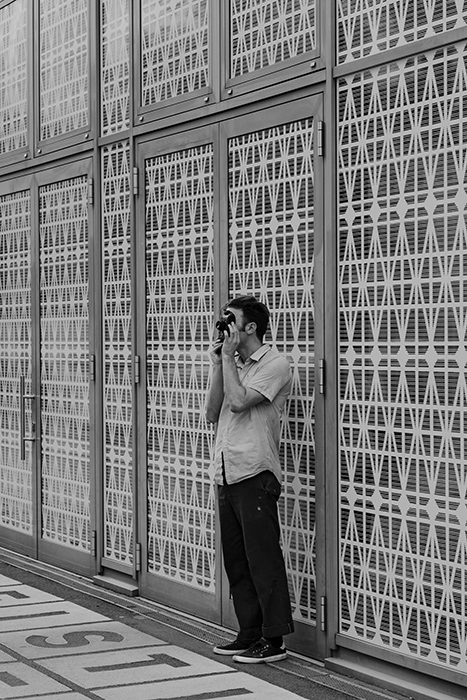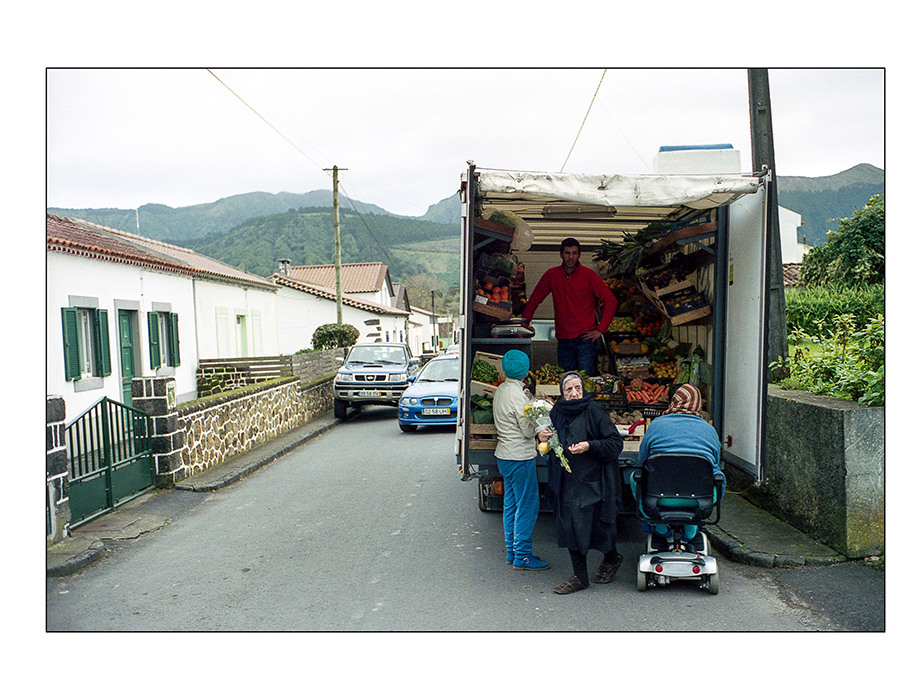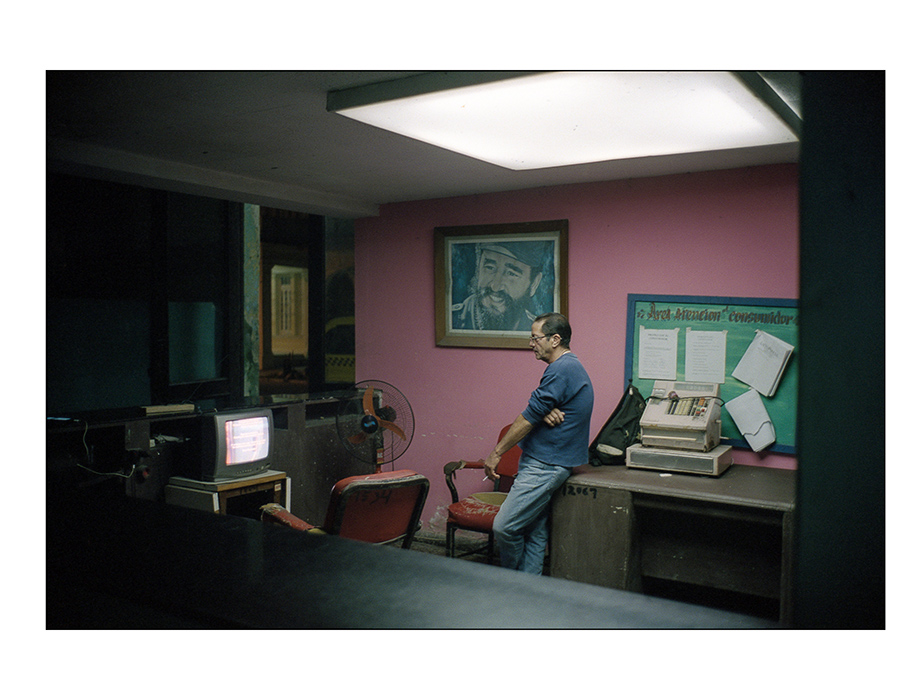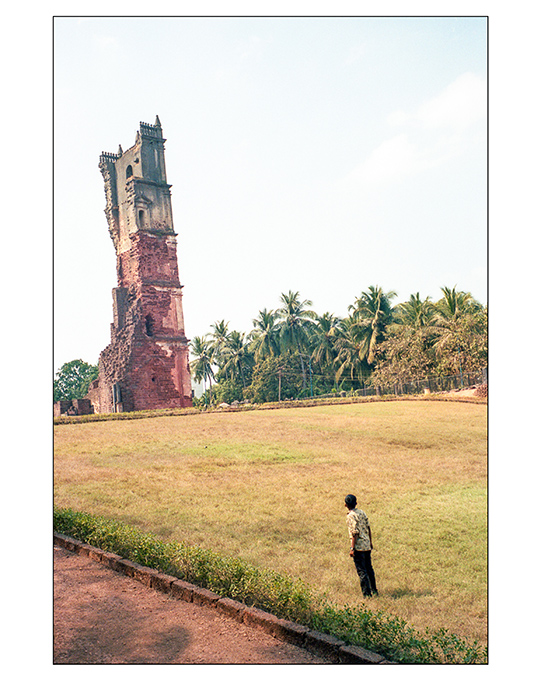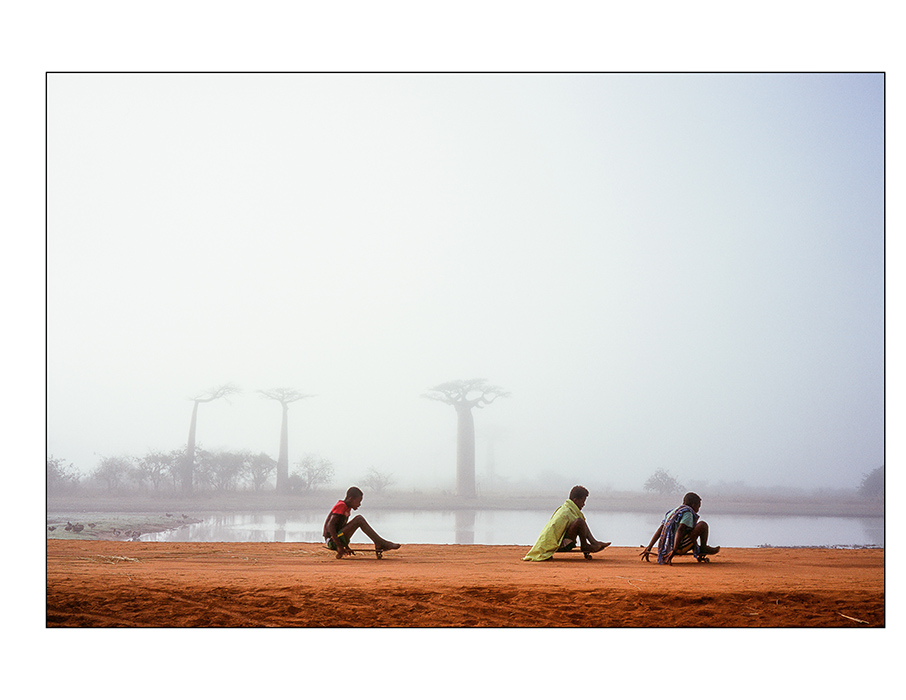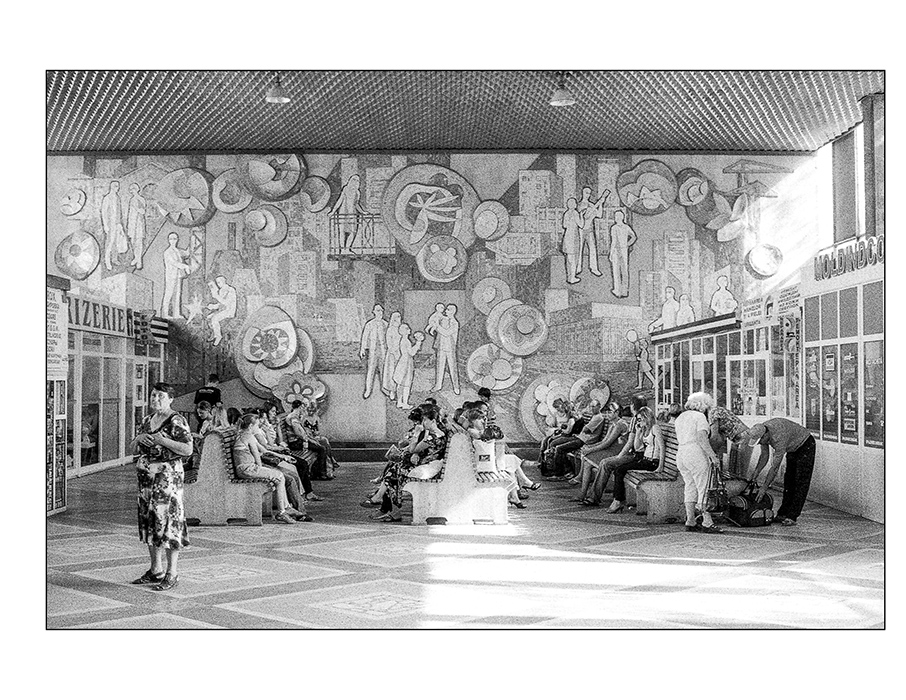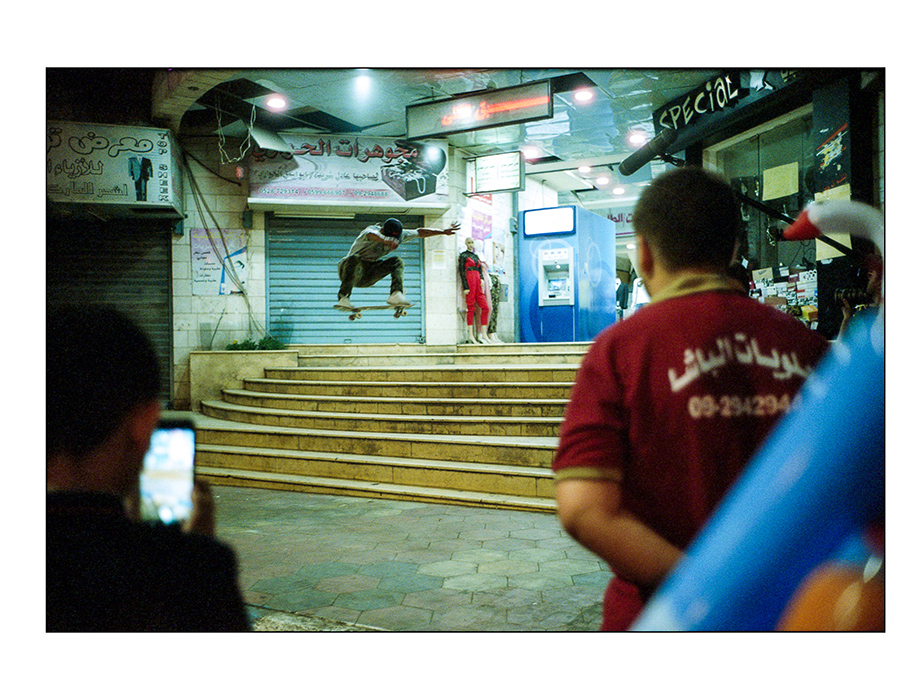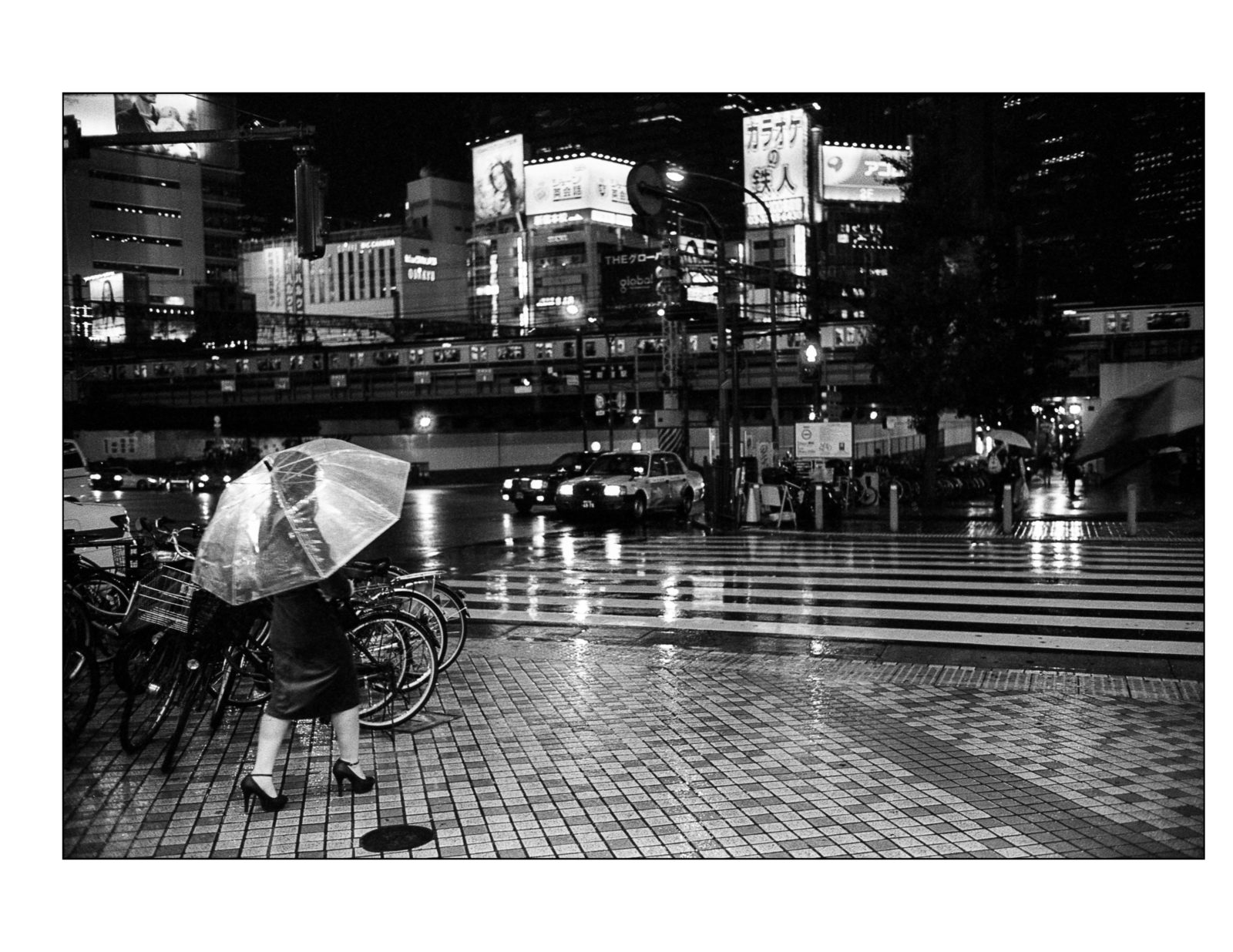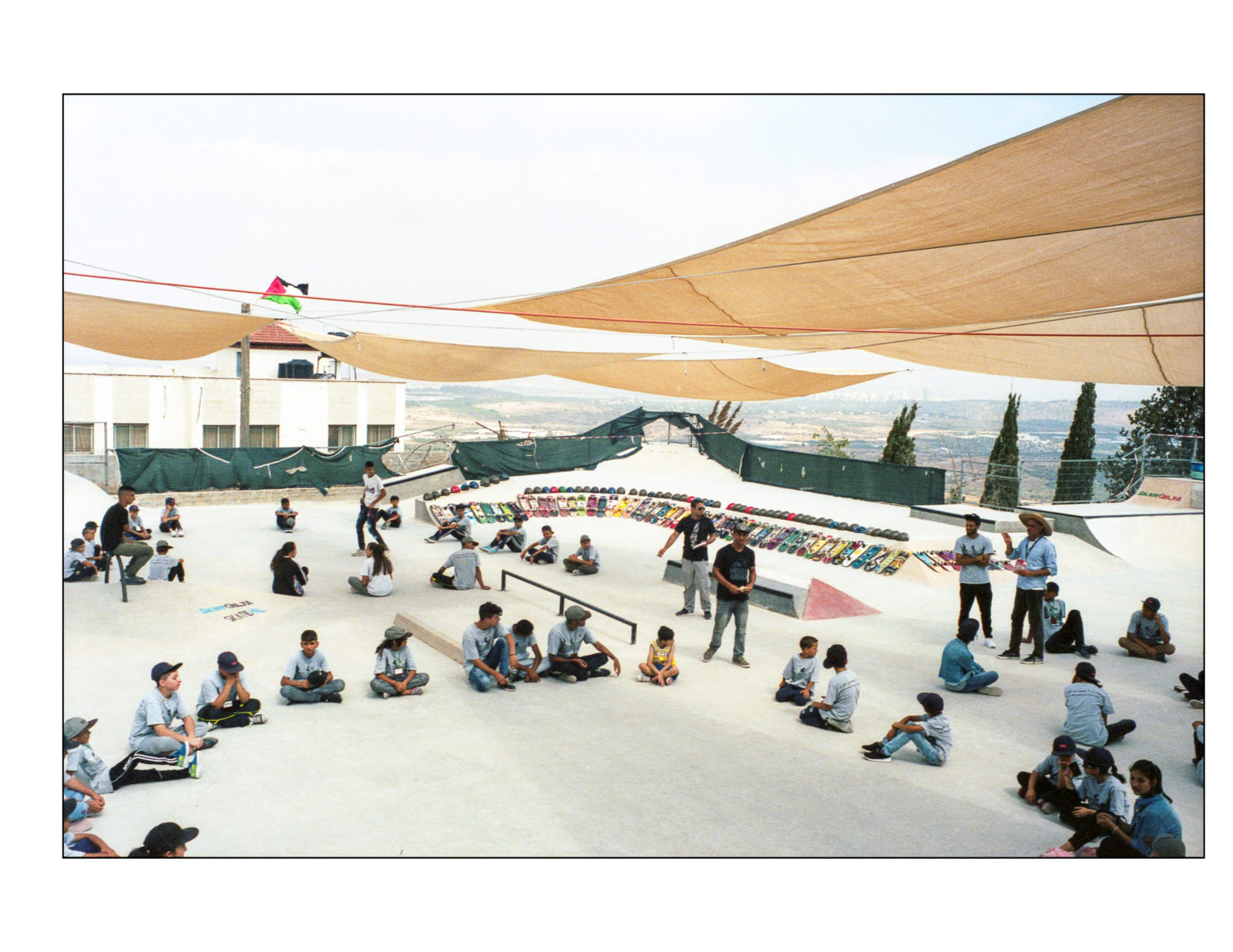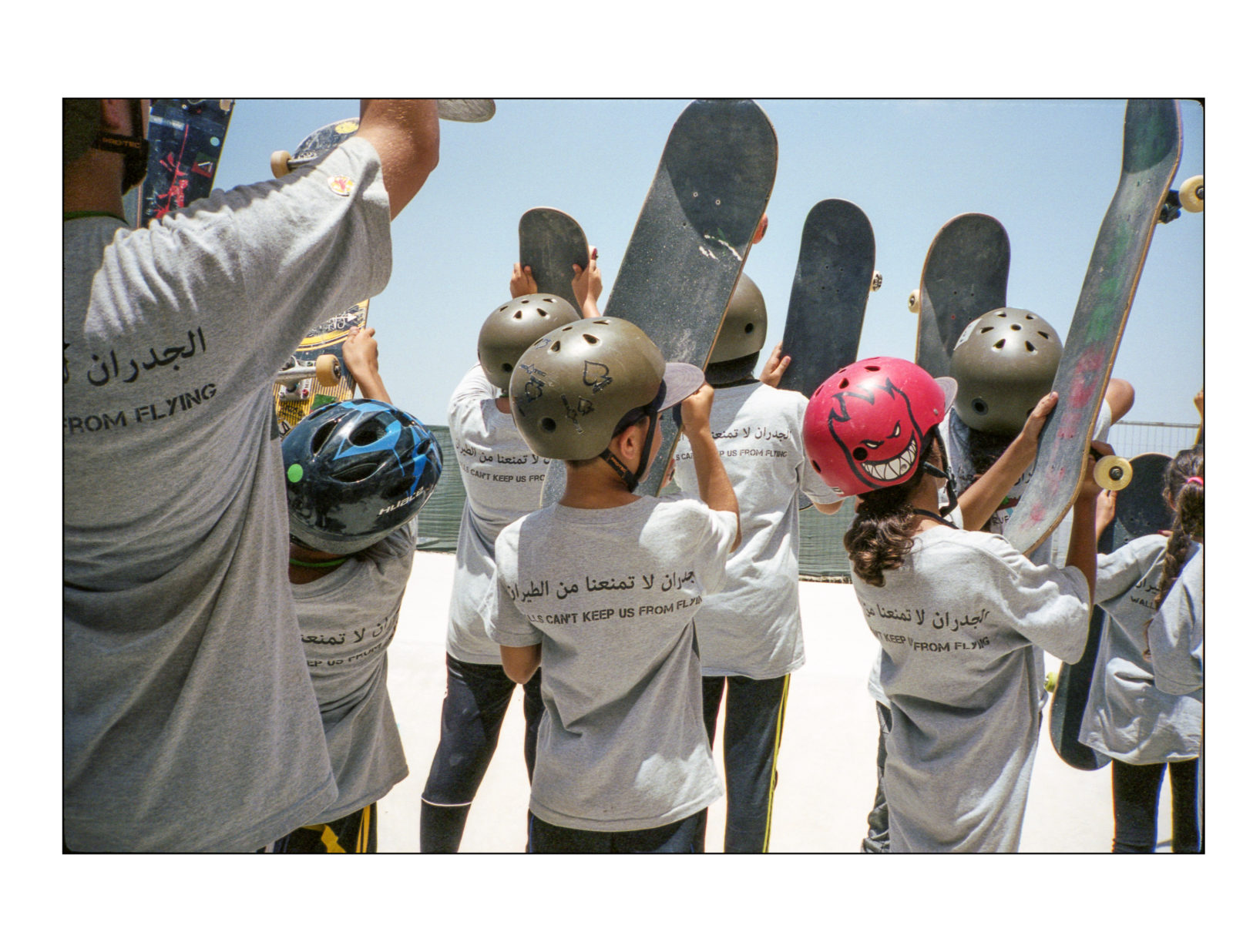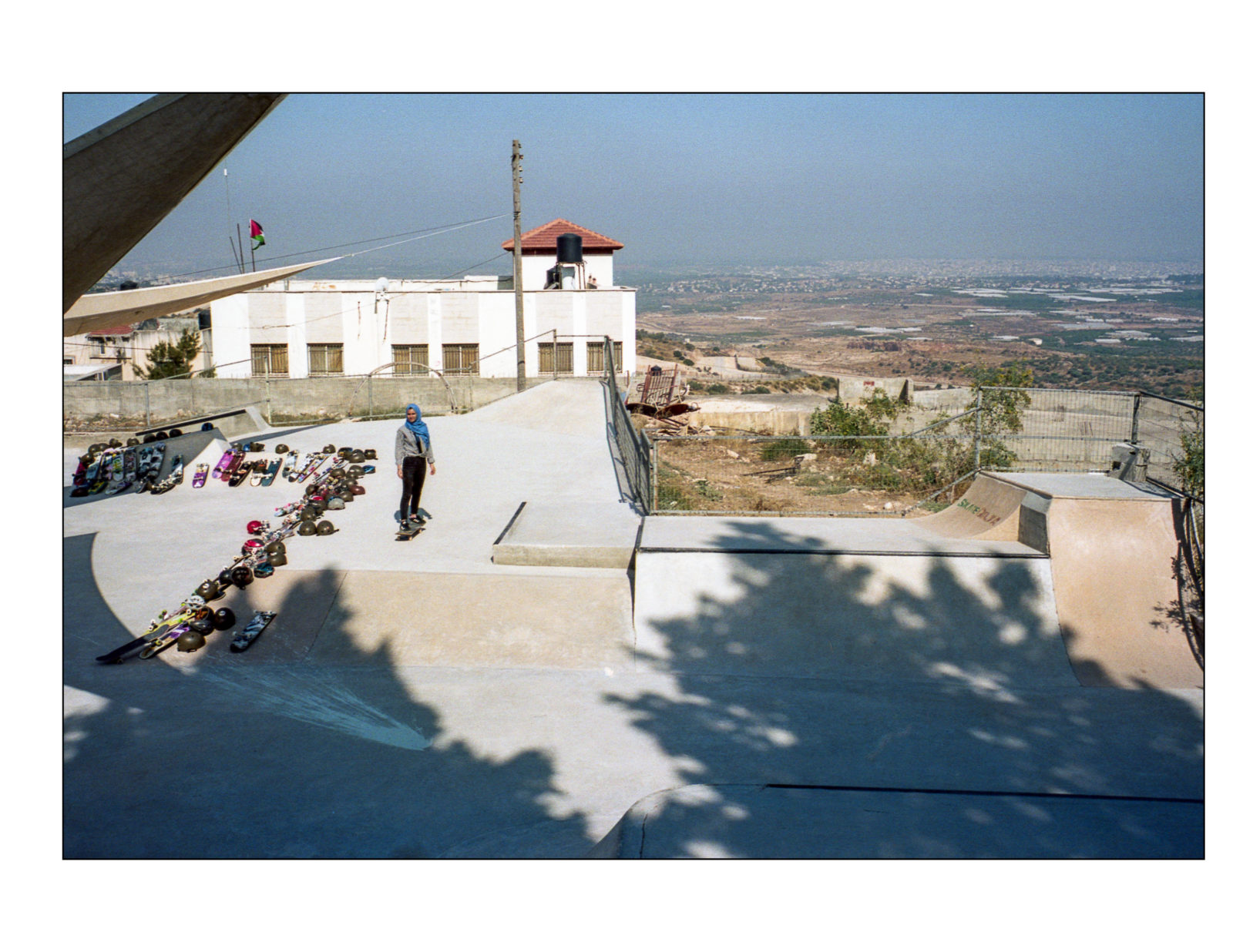Interviews
Nestor Judkins on Pro Skating during the Virus, Traveling the World, and Wanting to Make a Difference
Interview by Wesley Miller. Find him here: Email | Instagram
Introduction by Matt Eversole
All photos and captions by Nestor Judkins
Diving deep into my hazy memory banks, I struggle to dust the cobwebs off of some Nestor Judkins organic data. My weakened hippocampus starts to fire neurons regarding an interaction with a young Judkins in his junior high school years. The Shorty’s team was in town, and my buddy George Nagai was the team manager at the time. He reached out to me to show them around and get some hang time. They had a small, bright-eyed, youthful, flow boy with them from my neck of the woods. A baby Nestor Judkins. So cute and willing to dazzle on a skateboard, illusion flips and all. When the van of fully sponsored, friends of Rosa left the Bay Area, they were headed in the opposite direction of where our child prodigy lived. I guess they called Mrs. Judkins to come and pick up her baby. With the sun going down and this lil’ guy being left behind to sit tight for his mom, I decided to do the right thing and wait with him. We talked. We talked about being flow for Shorty’s and wearing a Flip Skateboards t-shirt. We talked about other unimportant things, but what was important was the friendship that was blossoming.
Now, fast forward again a twenty plus years or so, that friendship still holds true. It makes me happy to see that my friend has had a long lasting career riding his wooden toy. It makes me happier to see that he has become a person that is giving back to skateboarding. With all the good times that we have shared, what puts a smile on my face today is the words written below. Thanks for caring about skateboarding, my dude. We’ve come a long way from sitting on the curb waiting for mommy.
-Matt Eversole
How is quarantine treating you? I saw on Insta that you have the TF up and running.
(laughs) Yeah, right. I built a box, which is fun, even though I really don’t have space to skate it. And quarantine is fine for me. I realize how lucky I am to – for now – still have a paycheck, and I have the ability to stay home. I lived in New York until about a year and a half ago, and it’s heartbreaking to see what’s going on there. I’m glad that I’m here (Los Angeles) now. I’m not bored or anything. I’m pretty good at staying home and keeping myself occupied.
How is the virus impacting you as a professional skateboarder? How about professional skateboarding at large?
The effect is real. This is definitely going to – no, it already is having a huge effect on everything in the world of professional skating. There are many things in society at large that were already heading one way, and this virus has sped up the process, or just revealed it more: systemic issues of inequality, lack of sincerity. I think for pro skating it’s revealing and accelerating the trends that have already been building.
Look, given social media and other things, we’ve already been undergoing a paradigm shift. Things like making videos, magazines, team tours, pro teams – these things have been losing emphasis. Personal branding and “influencers” are further blurring the lines of what it means to be “pro”.
“(the virus) is having a huge effect on everything in the world of professional skating”
The virus completely shut off travel for the foreseeable future and left all of us, professional skateboarders, at home. My whole career up to this point has been based on travel. My job was to film video parts, shoot photos for magazines, and travel. So, what am I supposed to do? I’m struggling with that. I’m not going to go out and post skating stuff right now – although that’s the new important aspect of the job. I don’t feel comfortable doing that because I don’t want to promote breaking the stay-at-home order; I take that seriously. Yet that’s a huge part of what our job has been turning into until this point. So what should I be doing?
Then part of me thought, “okay, well, then maybe we can go back to local videos”. For example, the Girl videos used to be all L.A. So, part of me was getting hopeful. I grew up with a crew in San Jose, and I know people can do great skateboarding from anywhere – look at the Tiltmode videos and what an influence they had. But I don’t know if we are able or willing to put a priority on anything that involves so much time, since you gotta feed the beast. Daily skate clips. Quantity over quality. Is filming a part kinda like a passion project these days? Since there’s just so much content, it creates an amnesia.
Ultimately, I think this is just going to further shift things toward instant gratification style skateboarding, which I worry will lower the credibility and quality.
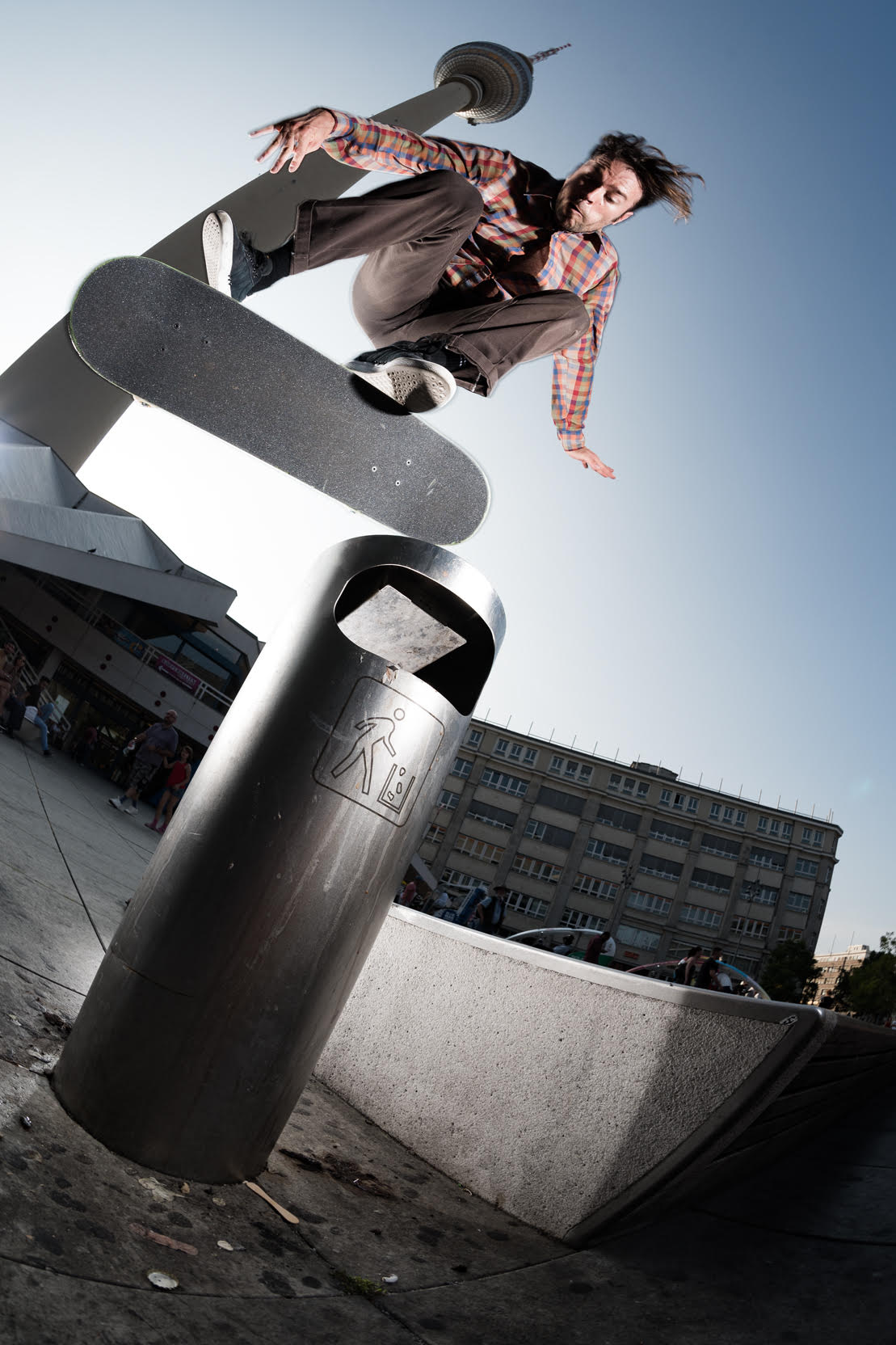
Skate Photo. Summer 2019. Switch flip a trash can at Alexanderplatz in Berlin. Photo by Biemer
I much prefer skate videos and team identities. Like Guy Mariano in Mouse will forever be skateboarding to me. I like the anticipation, that feeling of “whoa, I can’t believe that trick!”, instead of “oh yeah, I saw him do that at a park on instagram already”. But I’m just a critic and things change and I don’t want to seem bitter. To be honest, I’m just happy that I’ve been able to experience the version of pro skating that I love for so many years.
As for skateboard companies, I do think that this economic crisis will change things. I suspect that many companies won’t make it, and I worry that professional skateboarding is going to be pretty expendable, unfortunately. And to me it’s unclear what will determine who makes it: will it be based on talent and craft or sheer numbers? That’s an important determination with huge impact for the future of skateboarding. That’s my concern.
Maybe these are just my fears because I’ve already lost a very significant sponsor due to this virus. I don’t want to call anyone out because there are no hard feelings. We had a long relationship, and they’re going through a hard time, as are many companies, so they had to cut a certain percentage of their teams to stay afloat. Either way, the point is that the effects are real, and I see them continuing.
Overall, I am kind of freaked out, in terms of our potential future as a society, and of course that’s going to also make me worried about my job.I’m sure if I was able to skate more, then I’d be in a much better mood. Skating is a therapy for me.
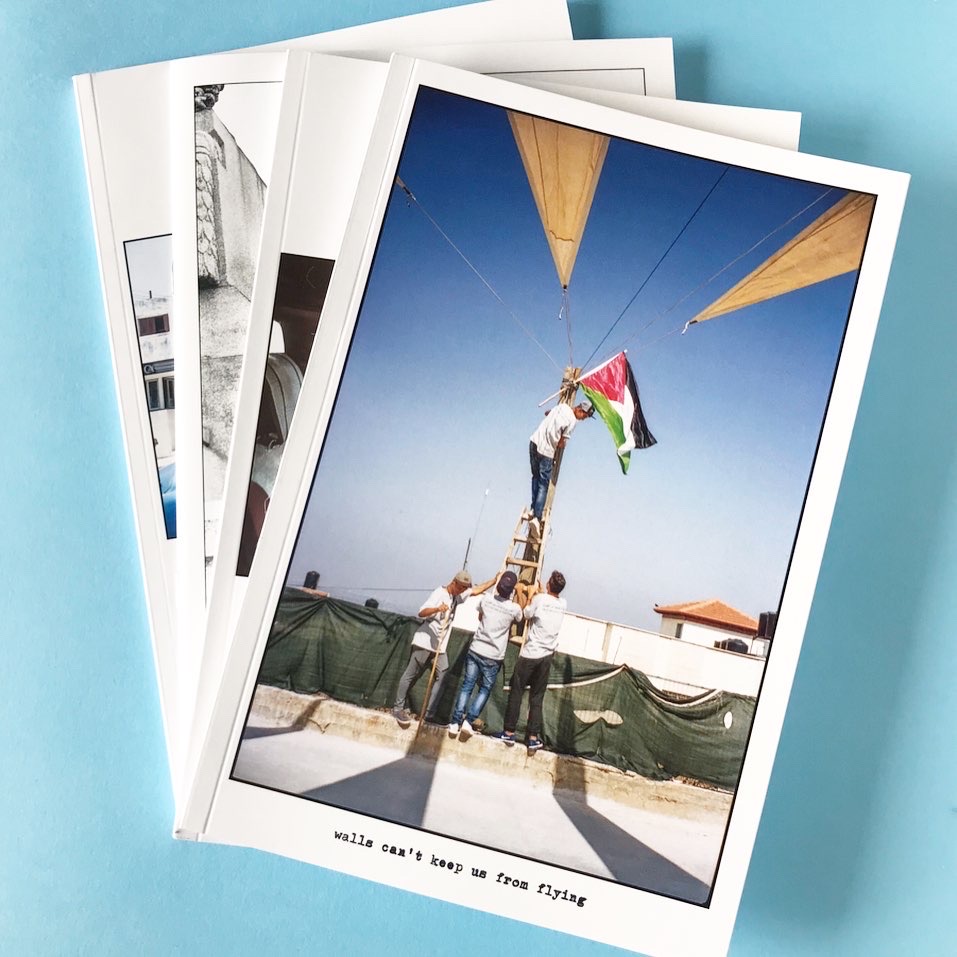
How did this thing with the ‘zines start?
I’ve been into photography for a long, long time, and of course I’ve been traveling through skateboarding. I always took pictures on every trip. I always liked documenting my experiences. In the beginning, I shot less, maybe one roll per trip, but now I shoot a dozen or something. After years and years and years of doing this, people started asking what I was doing with my pictures, which was nothing. After I look at them, I’ve always just put them in a shoe box.
Over the last few years, my interest in photography and photojournalism has grown. Then, I went on that trip to Kazakhstan – which was such a photogenic place and such a unique experience. And it wasn’t a trip for a sponsor; it was just a random group of skaters, and we all bonded over it. I just thought, you know, I’m going to make a ‘zine out of this trip to give to everyone so that we can all remember it.
Furthermore, before we left, I couldn’t find any information about Kazakhstan.
Yeah, maybe Borat.
Right. And some of the most horrible YouTube videos I’ve ever seen. I couldn’t find info on Lonely Planet or anything like that.
So I scanned the negatives myself, and my girlfriend had InDesign on her work computer, so I used that for layouts. Price wise, I needed to get 50 made if it was even going to be minimally cost effective. After I gave ‘zines to the people on the trip, I was left with about 40. I thought, well, maybe people will find this interesting, especially since it’s such a unique place – why not try to sell them and share the story?
Then you started using them to raise money for nonprofits?
Yeah, in my traveling for skateboarding, I’ve built connections with skate nonprofits that operate in Cuba and Palestine. I went on trips to both places wanting to help support the skate scenes. So I brought product, and I taught skateboarding in Palestine at a summer camp that Kenny Reed partners with. The main motivation was to go and help out, but I had also planned beforehand to make ‘zines from each trip to raise money for the nonprofits. Since I love photojournalism, it was my attempt at it: to tell the story about the nonprofits and the places in which they operate, as best I could.
Also, after my dear friend Ben Raemers left us, I went through all my photos of him just to see his face and relive our memories. After some time and thought, I decided to sell a few prints of Ben so the proceeds could go to support the Ben Raemers Foundation, which is doing a lot of great work to promote mental health in skateboarding.
And you’re considering starting your own nonprofit?
Yeah, that’s something I’ve been wanting to do for many, many years now. I haven’t got around to it yet for various reasons, one of which was I was so busy traveling for sponsors for so many years. Over the past few years, that has slowed down, and I’ve been able to go on trips of my own specifically to work with these other nonprofits. In doing so, I’ve learned a lot about their inner workings, so my ideas have evolved as well. Now, I’m going to use this time at home without any travel to finally try to get it going.
What are you looking to do with the nonprofit?
Well, the idea for the nonprofit is mostly to help make connections. I’m connected to the skate industry, and I know how much room companies have to donate boards, but they often don’t have connections to the causes, so it would be a facilitator to connect people in the industry to nonprofits overseas and provide them with product. My nonprofit would also research more groups and other areas in the world that I can link up with to provide donated boards and hopefully funding.
Everywhere I’ve been, everywhere I’ve daydreamed about going, there is some skateboarding nonprofit functioning in that place. In Nepal, for example, there’s a nonprofit I’ve read about called Skate Nepal that helps kids using donated boards, but how do they get access? I’d like to create that liaison between the skate industry and all these organizations. The analogy I like to use is how most of the food produced in the world gets thrown away, yet so many people go hungry. The boards from last season that didn’t sell or if some pro quit and the company can’t sell that product – I’ll gladly take it and carry it myself to give to kids in places where they can’t get boards, or where a whole crew is sharing one board. It’s skate redistribution.
“Everywhere I’ve been, everywhere I’ve daydreamed about going, there is some skateboarding nonprofit in that place. I’d like to create that liaison between the skate industry and all these organizations.”
I’ve noticed, by me doing this, so many other skaters will ask how they can help. People offer to give me boards. When I went to Palestine, Justin Strubing gave me some boards to bring out. Paul Shier gave me a bunch of Isle boards the last time I went to Cuba. A lot of people want to help, and I’d like to provide a way to do so, and people can decide where they want to help. Maybe the nonprofits can then take pictures of the kids with the boards and send those to the donors as well.>
I’ve already been doing this for years anyway. I’ve been collecting people’s leftover boards at the end of trips and bringing them to the skatepark at home, so they don’t just get thrown away by housekeeping. When I was in Madagascar in 2014, I brought two suitcases full of pretty much all the product that I had at home, and I gave it to the kids there. They had been skating the oldest boards I’ve ever seen. While it was nice that I gave everything to them that one time, I’m sure they’re still skating those same boards now, and I’d still like to help. In a perfect world, I’d like to create a way of getting a constant supply to these places, instead of just bringing boards once. So that’s the idea, essentially: develop and maintain connections and nurture skate scenes. I’d love to organize for other pros to come out and participate.
I go back to Cuba and Palestine often, and I’d like to be able to keep supplying them with product, maintain connections with the kids, and see them grow up. Perhaps people could even be mentors to whole new skate scenes, and I’d like to see where it could go from there. And that’s the beauty of skating – all you need is a board, some halfway decent ground, and a little free time – and you can change your world.
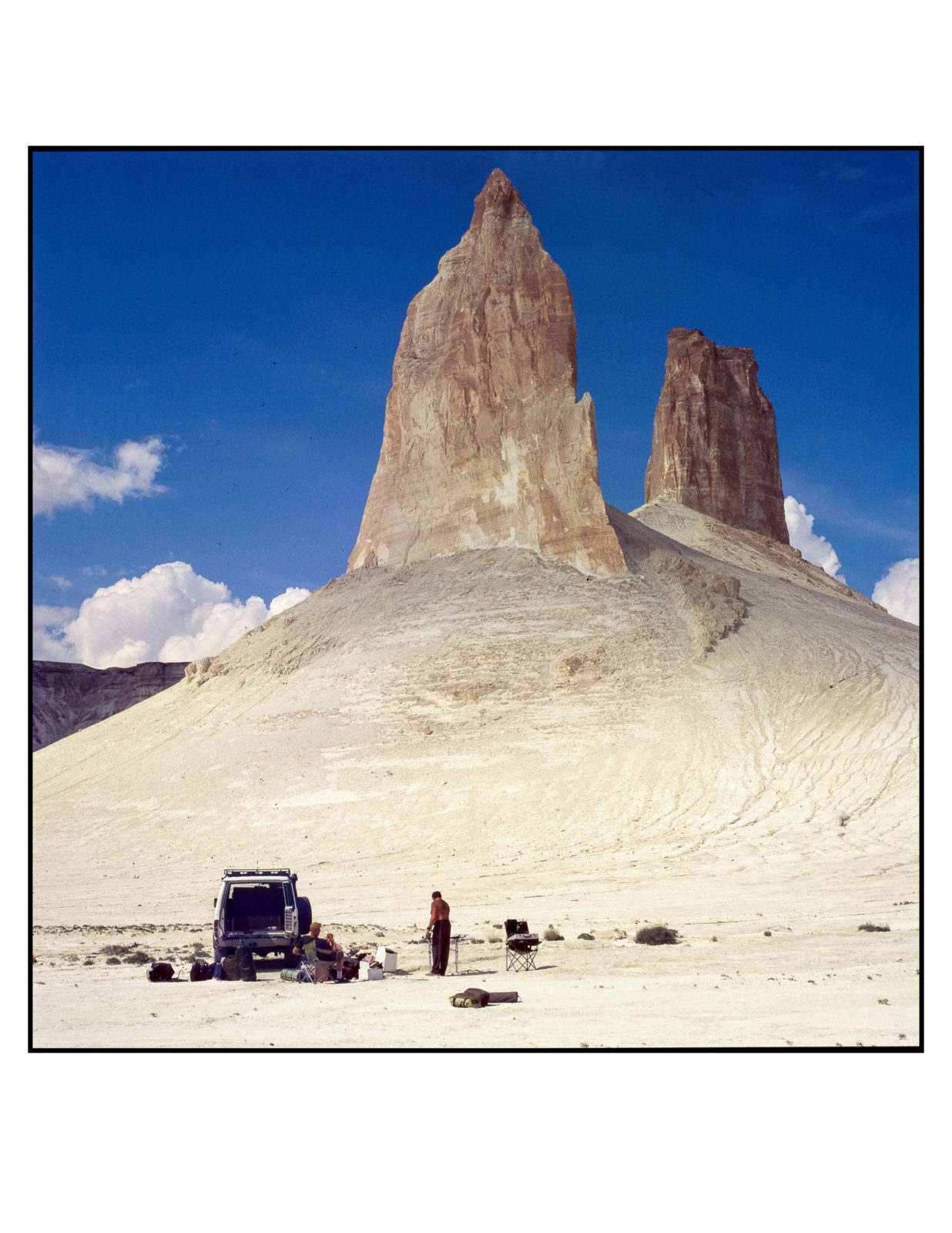
Scenery in Kazakhstan.
Yeah, anyone who loves skateboarding understands the sheer, simple joy of it.
Skateboarding provides a positive outlet, self expression, and a chance to build community and friendships. It also cuts across economic and racial lines, so it helps people open their minds. There’s a good deal of positive potential.
>I’ve also found that I need to do something that feels fulfilling in my life. I’ve been lucky to be a pro skater for so long, but there’s something I need more than just that. I mean, I’m a humble person, and I don’t do it for an ego trip. I feel that helping people genuinely is what I need to do. While this virus stuff has been scary for me, I’m also happy that I’ve had more time to focus on this stuff lately, and that’s what I want to continue to do even after I’m not able to skate professionally.
“I’ve also found that I need to do something that feels fulfilling in my life. I’ve been lucky to be a pro skater for so long, but there’s something I need more than just that.”
I want to talk about a few of the images, and the stories behind them, in these ‘zines – because some of them are pretty striking. Do you find it difficult to write about traveling though? In the introduction to the Cuba ‘zine, you talk about how certain things are true even if they are cliche. Is it hard to find the right way to talk about things so that you do them justice?
It’s really hard. In Cuba, I was worried about taking too many photos of the old cars because that’s a cliche, but it’s hard not to because they’re so incredible and they are everywhere.
I don’t know, maybe cliches are cliches for a reason. There is something in there. There’s a fundamental truth in it.
True. It can be hard to have novel experiences in general, maybe because there’s so much information out there these days that it’s hard – hard to be truly lost and discovering things, but I think it’s still worth it to try. You still find so much to marvel at.
One of the most striking pictures, I thought, is the elderly lady with a cigar. There are two photos, but I love the close up of her.
Yeah, that photo (laughs). That’s definitely a cliche. She was actually in the tourist area in Havana, which has seen a lot of support since the country opened up to tourism. I think it was on the side of the National Art Museum. There were two or three women of different styles with cigars who would pose for tourists. It’s a tourist attraction, but instead of selling candy or something, they’re selling you a photo where they pose with a cigar. She was the most interesting as she was really old and just puffing away at this big cigar, and the other ones looked a little more like postcards.
Her face has a thousand stories, and it’s also funny because I looked at her and I thought “I don’t know how old this lady is, but I’m pretty sure she can kick my ass”.
Yeah, I gladly paid her to take a photo. That lady had something really interesting in her. Her expression also reflects what I was hoping to communicate with the ‘zine: the resilience of the people. The trade embargo has been going on since 1960. With everything against the people there – especially the might of the United States – it’s insane that they’ve made it this far. And it’s such a small island. You see it in the people you meet there.
As for the cars, yes, it’s a tourist thing of looking at, say, a pink convertible Chevy and getting a ride in it along the waterfront. But those are just some of them. The majority of the old cars are churning out black smoke and are just taped together and seemingly running on boat motors – but they make them work.
There are also some photos in there of a guy with homemade skateboards. There’s a photo that’s meant to show that they came from a mold that he keeps under his bed, and he makes these boards out of plywood. People there just figure it out because they have to, and they’re all super resourceful and very aware of the situation. But they don’t gripe about it. There’s a definite contrast to our consumer culture here where we always want a new…whatever it might be. And let’s be real, oftentimes we pro skaters set up a board once and then throw it away, focus it. It’s like, “dude, come on”. These things have so much life left in them.
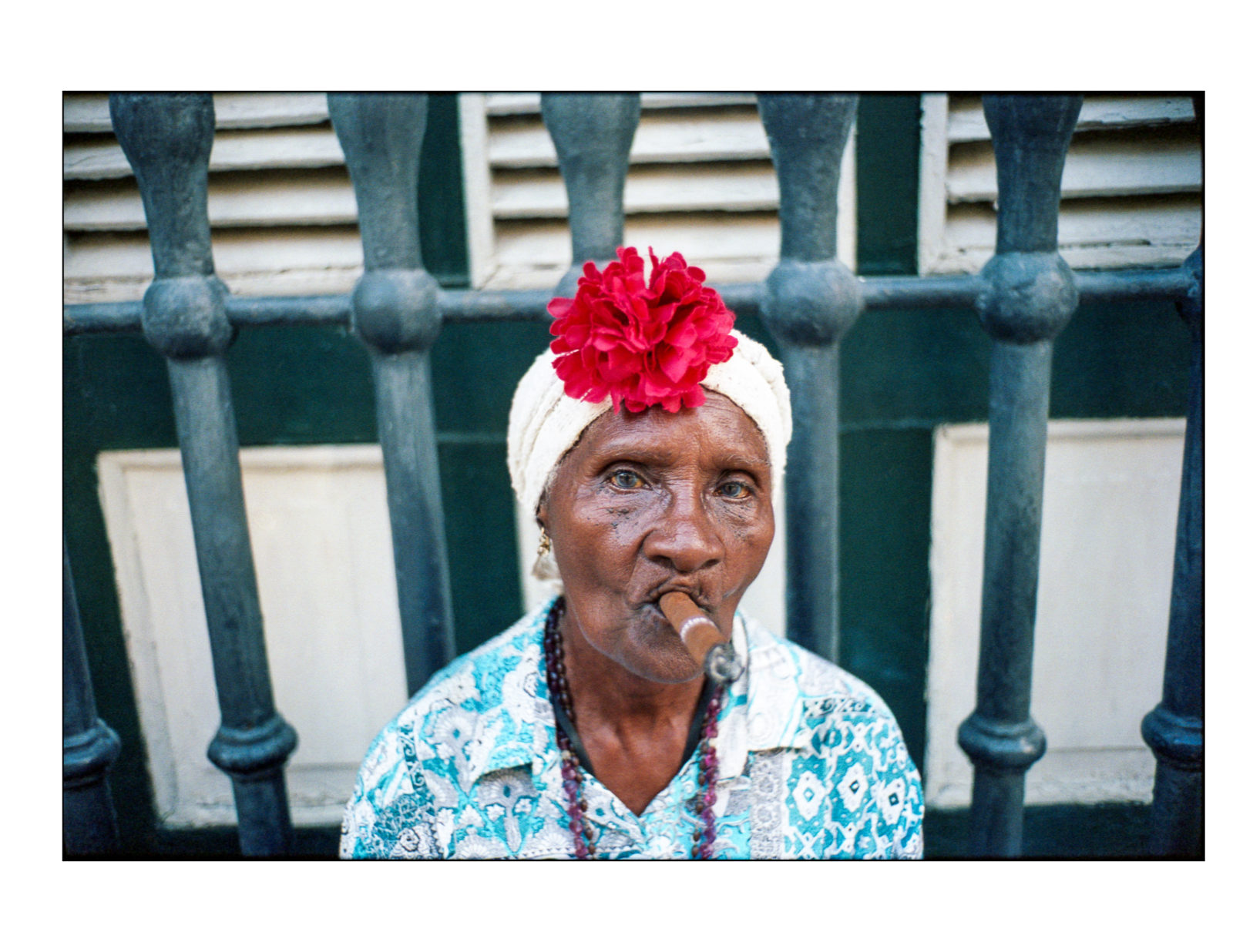
Havana, Cuba 2018. Old woman with cigar.
I also had the chance to read the Kazakhstan ‘zine. This one was the most exciting one to me. There’s something to the scenery in that area of the world, Mongolia and westward. I don’t mean to romanticize it, but I probably do anyway, even though I know life can be very, very tough there. First of all though, how was taking a train ride for 75 hours?
Oh, that was fun. I like the process of traveling. I also like trains. I think they’re romantic to us because we don’t have them here so much, but in the former Soviet Union, India, and so many other places, the train is a more manageable way to travel. It’s economic, so many people rely on it. It takes way longer, of course. It’s bumpy, and it’s slow, and it can be inconvenient, but for them, it’s just the way you get around – you’re not gonna fly, you can’t afford that.
And for me, it’s also a romantic thing because it’s a slower version of travel. I like staying in the berth, and you can read in the train car, go to the restaurant. You can just sit there and look out the window – and days go by.
You can probably feel the landscape gradually change.
You’re not flying over. Kazakhstan is very flat, and you’re watching it for days on end, and you’re amazed to see hills and mountains form or even to arrive somewhere new. You’re definitely aware of the space that you’re traveling, and over there it’s a huge amount of space. I think Kazakhstan is almost a third of the size of the U.S.
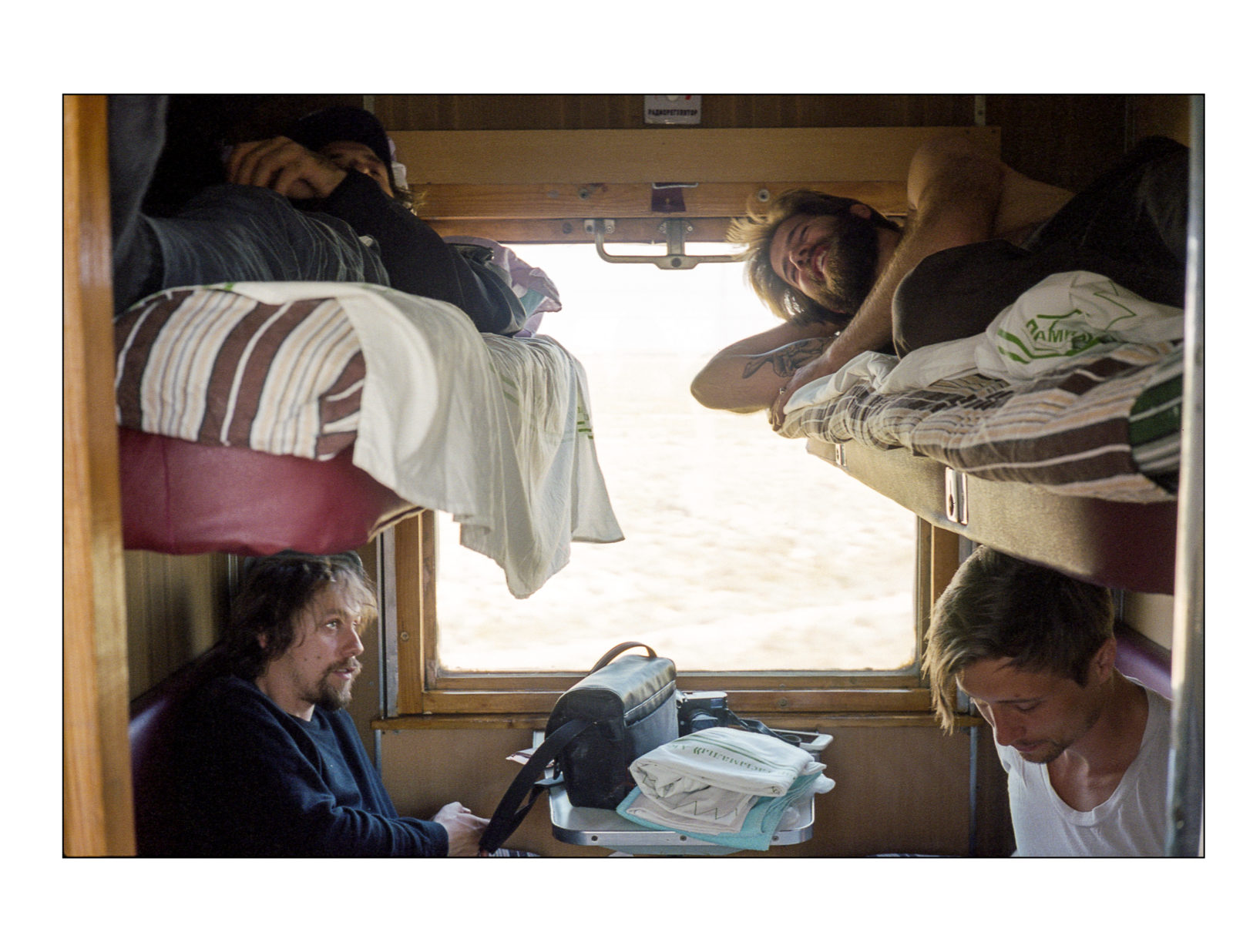
We spent days traveling the breadth of Kazakhstan by train. Here we are passing time in the berth, and a shot of the trains at one of the many stops along the way, where you have a few minutes to get out and explore the microcosm of the train station.
You have these striking pictures from that trip of ships by the Aral Sea that are completely land ridden. I read up on it, and it’s considered one of the worst environmental disasters in history, but most of us have never heard of it over here.
That was actually the focus of the whole trip. That was Patrik (Wallner’s) trip, and that’s how he plans them: there’s something he wants to go see, and we build skateboarding around it. The sea there disappeared almost overnight and left all these decaying ships.
That’s so wild.
Yeah, it was just mismanagement and the hubris of the people in charge who didn’t realize the consequences. The Soviets diverted the fresh water in this huge lake, one of the world’s largest. They were trying to grow crops somewhere else, in an area where you can’t grow anything anyway, and then of course it didn’t work, so all it really accomplished was destroying a huge lake and the livelihoods of the people who lived off the lake. It’s like the dams they built in China that flooded villages, or the freeways in the States that tore up communities. It’s just so bizarre. That whole story, and that place, was depressing. There’s nothing there. The people who were left behind are there – but nothing else. I definitely wanted to write about it.
That’s my hope with the photos though: you see these images and wonder “why is there a ship in the middle of nowhere?” The one I liked the most was the ship that someone built their house onto.
“That’s my hope with the photos though: you see these images and wonder ‘why is there a ship in the middle of nowhere?’”
I’m thinking about these places and communities you cover – Palestine, Cuba, former Soviet states, the remnants of the Aral Sea – and it seems that the common theme is groups of people who are stuck in situations beyond their control, often oppressive ones.
Yeah, I’m motivated by things like that, things that strike my emotional core. Injustice and finding ways to possibly help individual people there. In these places, it’s history, it’s politics, it’s whatever created this situation that we can read about in the newspaper and just easily move on with our lives. But when you go there, and you actually work with people, and you see how much it affects their lives – it’s tough. This is just the reality that they’re born into. I think about that a lot.
Then I think about where I grew up, and all the chances I’ve had in my life – it’s just luck. For some reason, by virtue of birth, people are born into situations. People in Palestine are simply born into living in an occupied state that they have no escape from. It’s overwhelming coming back from there. The people there are great too. They have this wonderful sense of community and humanity, and they’re welcoming. Where I come from though, you can’t read anything about what they’re like as people, but when you go there they open their doors, and they give you their food.
Skateboarding is a good outlet for these kids with little else. When you have nothing else, frustration can easily lead to bad things. So, a little thing we could do was help build a skatepark up in this town and provide a respite.
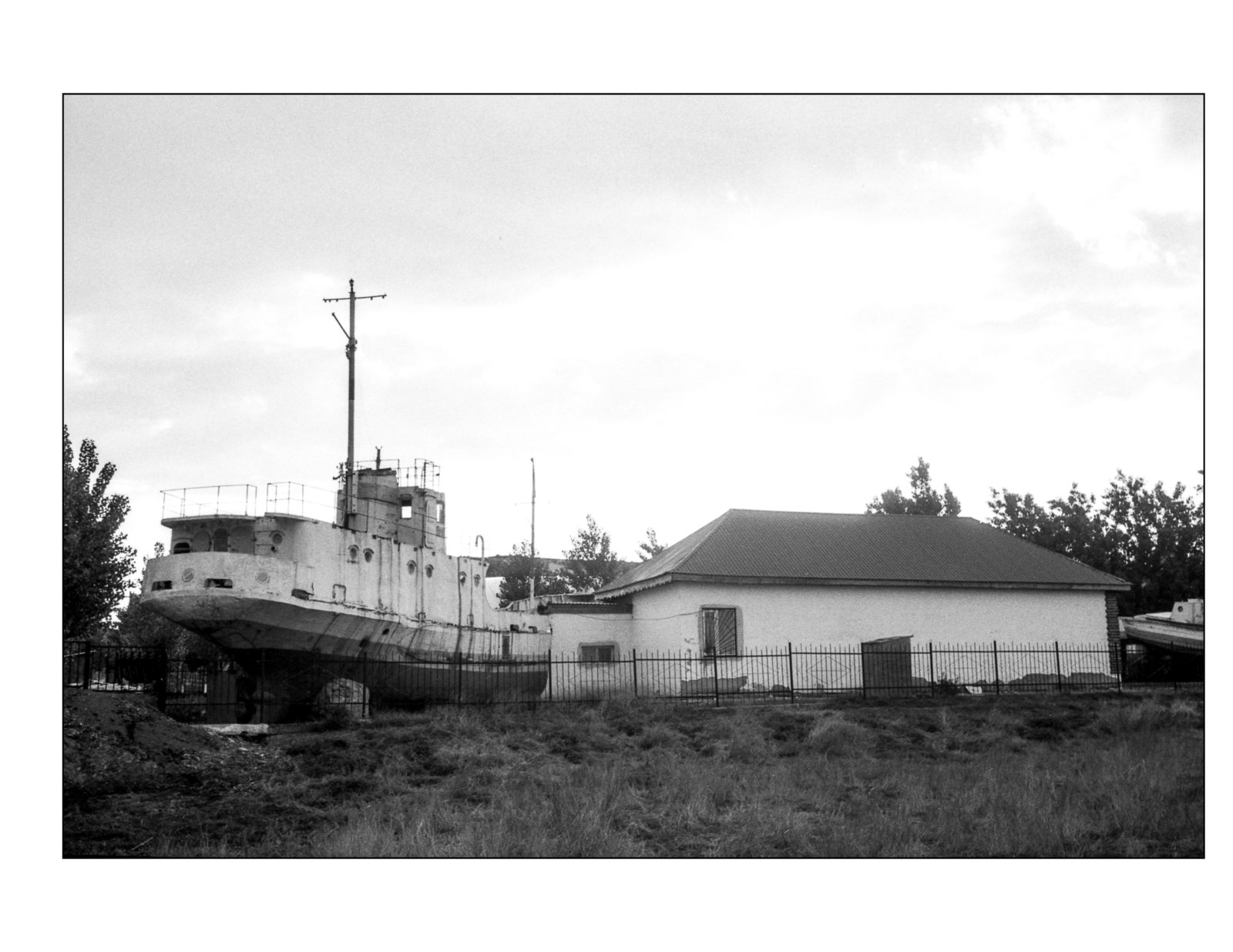
This used to be a port town, An abandoned boat was repurposed into a house at what was once the water’s edge.
I can’t say that I’ve been to the places you have, but I have lived in both the U.S. and a third-world country, and I think I may always struggle to understand why I was born with the blessings that I have. It’s hard to know what to compare it to – maybe some sort of survivor’s guilt?
I do feel a sense of guilt, a first world guilt. Especially an American guilt. And then I feel guilt for growing up in my situation and seeing other situations and how easily those could have been my circumstances. I think that’s part of the motivation – appeasing that guilt. Obviously, it feels good to help people, but (pauses) coming home from Palestine, I couldn’t sleep at night in my apartment. I just felt weird. I felt bad leaving the people there. I felt the same way with Cuba. I travel a good bit, and when I talked with my friends in Cuba about it, well, they’re not able to travel anywhere. One of them is super good at skating, and he was like, “hey man, how could I get sponsored?” I didn’t know what to tell him. It’s not possible because of these other things outside of his control. Politically, American companies can’t send him free boards or whatever. It’s hard.
“When I came home from Palestine, I couldn’t sleep at night…”
Speaking of traveling, I’m curious – did you ever end up going to Yemen?
No, I didn’t. I regret that. I think that’s why I’m doing more trips now, or at least I was before the virus, as I was more busy with sponsor trips at the time. I stayed in San Francisco for an Adidas trip, which was the obvious choice.
But, coincidentally, the day after my friends left Yemen is when the civil war broke out.
Oh man.
I was also too scared, if we’re being honest. There are a lot of times where I’m eager to say I’ll go, but then I do get scared. That one made me nervous. Looking back, it would have been fine. But yeah, I was too scared to go.
Have you ever read Barbarian Days?
I haven’t, no.
It’s excellent. It’s an autobiography by a surfer who freewheeled it across the globe in search of adventure. It’s unbelievably well written, and he has some fascinating stories to tell. As he travels, he starts a career as a writer, reporting on the injustices he sees. So, as we’re talking, I can’t help but think of that book because I can see parallels with your life.
Towards the end, he talks about his risk calculus gradually changing now that he has a wife and a daughter who depend on him. I’m wondering, especially being married now and no longer 20 years old, if you are growing more cautious.
Yeah, definitely. I think you just learn. You think you’re invincible when you’re younger, or you don’t even think about it – you just assume it somehow. The more places I’ve been, the more I’ve realized what could happen. There have been a lot of weird coincidences. I was in Japan when the nuclear meltdown happened. There are a few other weird things that have happened over the years and then luckily missed me, like the civil war in Yemen. A few years ago, I was going to go back to Madagascar but the plague, yes the bubonic plague, broke out.
I try to keep the adventure, but you’ve got to think about it. You start to pay attention and read more and think it over. You start to consider your mortality, and I believe in my mortality now.
Support Nestor’s ‘zines and fundraising here.
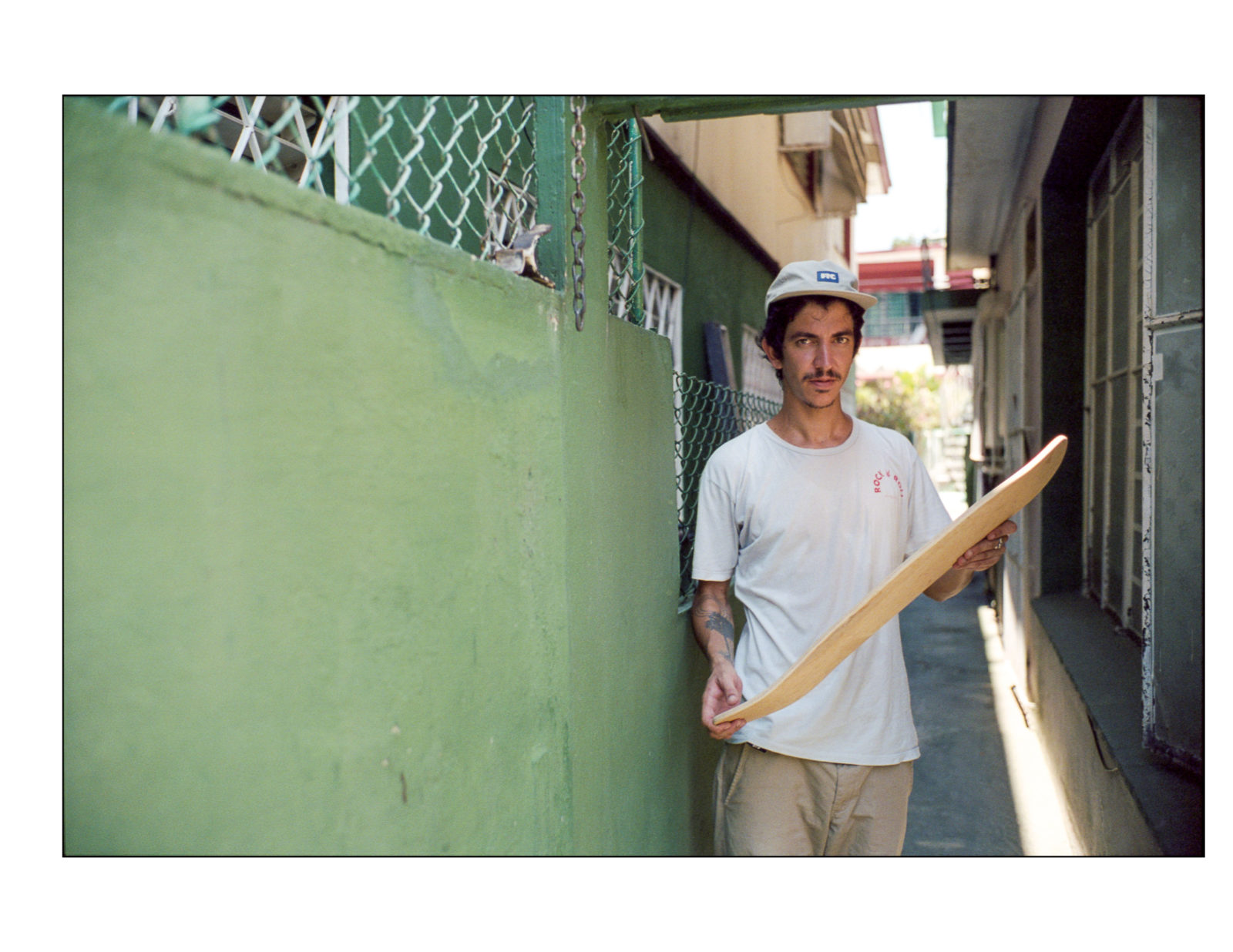
Havana, 2018. Ariel Gomez with his homemade skateboard.
